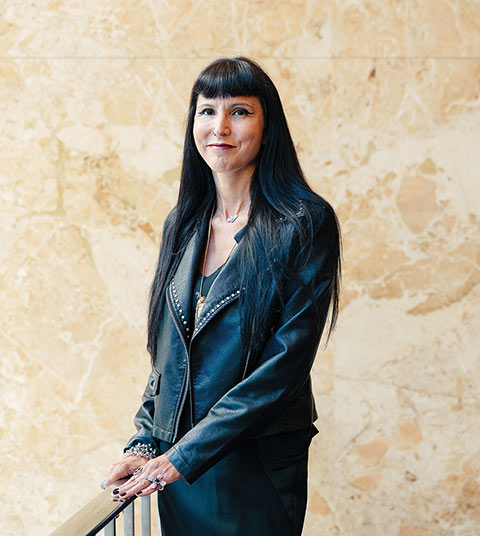Prof. Suzanne Stewart, a member of the Yellowknife Dene First Nation, knows firsthand what it’s like to be homeless and how it affects one’s health. Her six siblings were taken from her mother, a residential school survivor, in the 1960s to attend residential school themselves, or to be given up for adoption. Stewart’s grandparents sent her to Edmonton to live with an aunt, but she soon found herself living in foster care and group homes. She ran away several times, and, beginning at the age of 14, lived on the streets for stretches before pursuing higher education at 25.
Now, as the director of U of T’s Waakebiness-Bryce Institute for Indigenous Health, Stewart is tapping into her own experience – and all that she’s learned through her work as a counsellor and psychologist, and her academic research – to spearhead the Toronto Indigenous Women’s Shelter, which will open its doors next spring. “The system, social services, weren’t there to look after me,” says Stewart, “and that’s not just my story, but the story of all Indigenous women.” Pamela Hart, a colleague from the Toronto Indigenous community, is co-founding the shelter with Stewart.
The new facility will employ traditional healers and elders to offer services based on Aboriginal understanding of health. Every day, Stewart says, women – and Indigenous women in particular – are denied access to homeless services because they don’t fit into specific categories, such as having children or being in an abusive relationship. Indigenous women also face racism, on top of the intergenerational trauma they have experienced either directly or indirectly as a result of the Indian Act, residential schools and the child welfare system. “Many organizations that provide services to the homeless don’t understand the impact of colonization on the mental health of Indigenous people,” Stewart says.
Stewart’s mother has lived on the streets of Vancouver for close to 30 years, and some of her siblings have also experienced homelessness. Her mother often faces derogatory stereotypes that remain closely attached to the Indigenous homeless, Stewart says. Shelter staff might assume that she’s struggling with drugs or alcohol, or both, when she’s not. Stewart’s own children, she notes, are the first in four generations of her family not to experience the threat of being taken away.
“Seeing all of this, I knew that I wanted to help people,” she says.
This summer, Stewart and her team were negotiating with the city for a building that could accommodate at least 25 to 30 beds for those in need. Stewart would also like enough space for a sweat lodge and a community garden, which would address the issue of food security, a common challenge surrounding homelessness and health. The garden would also help Indigenous women reconnect with the land around them.
The mission is to build the shelter around the needs and recommendations of elders, youth and homeless people within the city’s Indigenous community. “All of this is really going to be grounded in people who are trained in Indigenous knowledges, within their discipline. That is a requirement,” Stewart says.
There’s a teaching component to the new facility as well. The shelter will offer work placements for students at U of T’s Ontario Institute for Studies in Education and in the Indigenous Trauma and Resiliency program at the Factor-Inwentash Faculty of Social Work, among other U of T programs.
As far as what Stewart’s role will be when the shelter opens its doors next year, she says that will depend on what role the board and the community want her to have. “It’s my job as a professional and a researcher to get systems of psychology and mental health to create a space for traditional knowledges and healing, because that’s how Indigenous peoples are going to get better,” says Stewart. “It is my dream.”
Kyle Edwards is a freelance writer in Toronto and a former policy researcher at the Chiefs of Ontario.
Recent Posts
For Greener Buildings, We Need to Rethink How We Construct Them
To meet its pledge to be carbon neutral by 2050, Canada needs to cut emissions from the construction industry. Architecture prof Kelly Doran has ideas
U of T’s 197th Birthday Quiz
Test your knowledge of all things U of T in honour of the university’s 197th anniversary on March 15!
Are Cold Plunges Good for You?
Research suggests they are, in three ways





One Response to “ A Refuge from the Streets ”
Prof. Suzanne Stewart is a brave person and I commend her very much. Her work is immensely valuable for Indigenous women everywhere. As a new Canadian originally from England, I feel doubly ashamed of the racism that persists in Canada against Indigenous women and men and children.